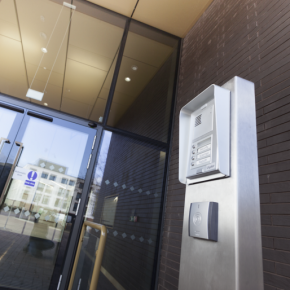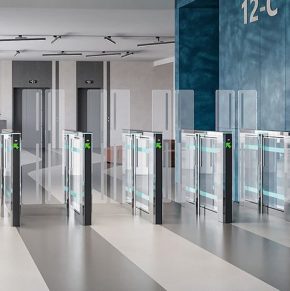
Modern tech comes with a price but it’s worth it in the long run say Aspex
Investing in modern technology comes with a price, yet in the long run, it can save time for businesses and protect individuals, says Aspex.
As the use of electronic lock systems continue to grow, especially in the private rental sector, Ashley Burberry, MD at Aspex, shares five reasons why more businesses should be shifting away from traditional keys and switching to an access control system.
========================
The shift to electronic locking occurred in the hotel sector around 20 years ago due to security concerns regarding people retaining keys and accessing rooms.
Whilst card operated access control systems are now commonly used on hotels and commercial buildings, their use on residential buildings is relatively scarce. However, this is likely to change as the private rental sector is likely to grow by 24% in 2021, meaning one in four people will be renting rather than owning a property.
Increasingly, the developers of these schemes can see the advantage of extending a building’s access control system from the external perimeter doors onto the apartment entrance doors, as this will give building management long-term flexibility.
========================
Top five reasons to make the switch
1. Cost
Though the initial cost of the electronic access-controlled lock is more than a conventional lock, the operating cards are a fraction of the cost of replacement keys. If a resident leaves and keeps the card, the lock can be reprogrammed rather than replaced.
Whilst a traditional mechanical locking hardware provides security, an access control system offers a higher level of security as businesses can track and control who has access and when exactly they have access. It also allows businesses to restrict certain areas within the building if it was needed.
2. Smart and convenient
37 million people in the UK use a smart phone and an access control system that can be operated using Bluetooth technology gives individuals more convenient ways to open doors.
Access control systems are becoming a preferred choice for investors in the private rental sector as individuals can gain immediate access to a rented room through their smart phone within a matter of seconds, all through an app.
This is an ideal solution for those who travel on business and rent out apartments on a regular basis, as they don’t have to rely on a receptionist to pick up the keys and they can come and go as they please.
These apps can also be developed with management companies to allow the residents to carry out other actions such as booking meeting rooms.
3. Security
In the private rental sector, there can be a high turnover of residents with many staying for a short-term. The knowledge that a previous resident cannot have a key for your home is reassuring, as is the thought that if you lose your card or phone, a new electronic key can be instantly issued.
This isn’t the only security aspect of these electronic locks, as they have been tested to the PAS24 security standard in conjunction with the doorset in accordance with Building Regulations Part Q.
4. Design
Traditional hotel style access control systems are large and not particularly attractive, which can be an issue for apartment schemes where aesthetic appeal of a system is an important factor to consider. The new generation of systems have separate small readers and can be used with any lever handle. They are sleek, minimal and contemporary and can be tailored to suit individual projects.
5. Simplified management
Access control systems are much easier to manage and maintain. When it comes to upgrades and new features, they can be applied automatically and seamlessly, without the need for site visits by technicians, thus saving time and money.
=========================
What’s next for access control systems?
We live in an era where the majority of what we do is controlled through our mobile phones therefore access control systems that allow access to your home will inevitably become the norm.
Wireless technology and cloud-based systems will lead the way, with more companies providing a service rather than just a product. Security is enhanced, costs are minimised, and individuals are protected – it’s a win-win situation all around.
Aspex UK,
Unit E Blaby Industrial Park,
Winchester Avenue,
Blaby,
Leicester,
United Kingdom,
LE8 4GZ
Phone: 0116 278 3506
Fax: 0116 278 4069
Visit Supplier's page
Latest news

17th April 2025
Nuaire shares expertise at Specifi Mechanical Services events in 2025
Indoor air quality and ventilation manufacturing specialist Nuaire is pleased to be exhibiting at the Specifi Mechanical Services events once again in 2025.
Posted in Air Conditioning, Articles, Building Industry Events, Building Industry News, Building Products & Structures, Building Services, Exhibitions and Conferences, Facility Management & Building Services, Heating, Ventilation and Air Conditioning - HVAC, Restoration & Refurbishment, Retrofit & Renovation
15th April 2025
West Fraser: CaberDek earns top marks from Home Counties carpentry specialist
A specialist carpentry sub-contractor covering housing sites across a large swathe of the Home Counties has come to value CaberDek from the West Fraser range for a variety of reasons: not least because the high quality panel product doesn’t destroy his operatives’ electric saws!
Posted in Articles, Building Industry News, Building Products & Structures, Building Systems, Case Studies, Restoration & Refurbishment, Retrofit & Renovation, Roofs, Timber Buildings and Timber Products, Wooden products
15th April 2025
GEZE: The Role of Access Control Systems in Enhancing Building Safety
Jane Elvins, Specification and Business Development Manager at GEZE UK, delves into the role of access control systems in enhancing building safety…
Posted in Access Control & Door Entry Systems, Architectural Ironmongery, Articles, Building Industry News, Building Products & Structures, Building Services, Doors, Facility Management & Building Services, Health & Safety, Restoration & Refurbishment, Retrofit & Renovation, Security and Fire Protection
11th April 2025
Don’t Do a Dave! It’s Time to Lock FIT Show 2025 in Your Calendar!
It’s that time again – FIT Show is back! You could be forgiven for thinking there won’t be much new to see when FIT Show returns to the NEC from 29 April – 1 May. Wrong!
Posted in Articles, Building Industry Events, Building Industry News, Building Products & Structures, Building Services, Continuing Professional Development (CPD's), Exhibitions and Conferences, Information Technology, Innovations & New Products, Restoration & Refurbishment, Retrofit & Renovation, Seminars, Training
 Sign up:
Sign up: